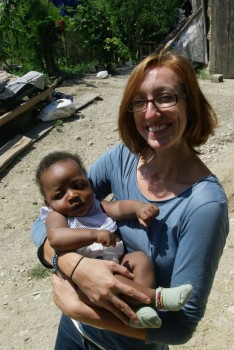Q&A: Allyn Gaestel '09 Provides First-Hand Reports of Haiti's Recovery

Allyn Gaestel '09 helps Haiti's people work towards a brighter future.
Details
When a catastrophic earthquake struck Haiti earlier this year, Allyn Gaestel was working as a reporter for MediaGlobal, a United Nations-based independent news agency that covers development and social justice issues in least-developed countries. Gaestel began communicating with diaspora groups in New York and Haitian grassroots organizations by phone, but wanted more than interviews. She wanted to bear witness to the unfolding situation and hear the voices of Haitians who are not able to make international calls.
Gaestel has been living and working in Haiti since the summer. She will speak about her experiences Wednesday, October 20 at 7:30 p.m. in Stokes 102 and Thursday, October 21 at noon in the Center for Peace and Global Citizenship (CPGC) Cafe.
Here, she talks to Haverford about the motivation for her move and the country's progress in rebuilding itself.
Haverford College: What inspired you to leave your job at MediaGlobal and travel to Haiti?
Allyn Gaestel: At the United Nations, I grew frustrated at being removed from the actual situation and having to rely on second hand information. I started reaching out to the Haitian diaspora in New York and hearing their perspectives, which often differed considerably from the official accounts. So I started preparing to move by taking Kreyol lessons and making links on the ground and with other publications.
My experiences at Haverford helped prepare me to uproot and move to a new place. I had three summer grants from the CPGC to work in Mali, Democratic Republic of Congo and Philadelphia. I learned how to put down roots quickly, and how to ask questions to find my way. My classes and advising from Professor Susanna Wing were also deeply formative. She taught me how to analyze politics and society, how to do research, and how to engage respectfully and deeply with local communities.
HC: Where are you living and working?
AG: I live in an apartment in Pacot, a neighborhood in Port-au-Prince. I am working as a reporter for several news organizations, writing about politics, culture, human rights, society, health, and the international humanitarian response. I do interviews and field visits with organizations and individuals across all sectors, from politicians and elites, to grassroots groups and individuals living in camps.
HC: What have been some of your most memorable experiences?
AG: Every day is a learning experience for me, as I begin to understand the nuances of the cultural and political scenes. I have met some inspiring people mobilizing to make life better for Haitians, like Vidho Lorville (http://www.vidholorville.com/), a respected painter now living in the U.S. He was here to do an art therapy project for vulnerable children living in residential care centers. He supported them psychologically, empowered them to express themselves, and compiled a tapestry of their stories that will be exhibited at the Contemporary Art Center of New Orleans November 6 through January 13, and at CULTUREfix Gallery in New York January 27-February 3.
I feel most productive when talking directly to Haitians about their experiences. When I visited Petit Trou de Nippes, a small rural city in the South, I attended a church service and afterward asked if any women were willing to stay and talk about their experiences with birth and health care. Over 30 women stayed, all eager to talk about their choices, their lack of choices and their experiences with the minimal health care available to them. I was able to publish their experiences in a report for the International Relations and Security Network, a think tank in Zurich.
HC: What is the current status of Haiti's recovery, and what more needs to be done for the country?
AG: From what I see, the recovery is moving very, very slowly. Rubble is still on the ground, people still live in tents, and the majority of aid money pledged has not been delivered. Most Haitians are rebuilding their lives themselves, relying on friends, family members and their own entrepreneurship to meet their daily needs. But it is still extremely precarious. And as I documented in a piece for the Foreign Policy Human Rights Blog the rainy season is here, and making life even more difficult for those living in tents and unstable shelter.
Haitians have repeatedly told me that citizens do not ask much from their government, but the government fails to provide even the most basic services. In my opinion there needs to be increased coordination of all the actors working in Haiti so the country can move from being a“republic of NGOs” to having a coherent social support sector.



